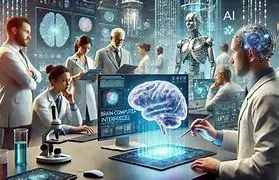✨ Introduction
What if patients could communicate with doctors using just their thoughts? What if you could monitor brain health in real time? Welcome to the world of Brain-Computer Interfaces (BCIs) — a silent yet powerful revolution that's reshaping the future of healthcare.
🧠 What Are Brain-Computer Interfaces?
BCIs are systems that create direct communication pathways between the brain and external devices. Originally used in neuroscience research, BCIs are now entering mainstream medicine, with implications ranging from restoring mobility in paralyzed patients to enhancing real-time diagnostics in ICU and even reshaping how medical scribes record patient data.
💡 Real-World Applications of BCIs in Healthcare
1. Neurorehabilitation
Stroke and paralysis patients can regain control over limbs using BCIs combined with exoskeletons and neurofeedback.
2. Communication for Locked-in Patients
Patients suffering from ALS or severe neurological disorders can "speak" through brain signals, enabling dignity and autonomy.
3. ICU Monitoring
Advanced BCIs can monitor brainwave activity in unconscious or critical patients — revolutionizing ICU alerts and early intervention.
4. Medical Scribing Automation
Imagine scribes or AI systems that not only transcribe but also interpret brain responses — making note-taking faster, more accurate, and deeply personalized.
🤖 How BCIs Are Changing the Role of Medical Scribes
With the advent of BCIs:
-
Patient cues and emotional states can be captured more effectively.
-
Real-time data from the brain helps scribes highlight critical info.
-
Enhanced accuracy in EMR documentation, especially in emergency scenarios.
This opens a new dimension in healthcare communication — where tech and empathy meet.
🌍 Who’s Leading the Charge?
-
India’s AI research hubs are exploring low-cost, accessible BCI tech for rural hospitals.
-
Companies like Neuralink, Synchron, and startups in Bengaluru are pushing boundaries of brain-tech fusion.
🔮 Future Possibilities
-
AI-based BCIs for mental health therapy.
-
Non-invasive BCIs for home health monitoring.
-
BCIs assisting in real-time surgical decisions.
🚀 Conclusion
The future is no longer far. BCIs are no longer science fiction — they’re today’s frontier in healthcare transformation. For medical professionals, scribes, and technologists, understanding and adapting to this evolution is not just smart — it’s essential.
Are we ready to listen to the language of the brain? The revolution has already begun.
🔗 Call to Action
✅ Loved this insight?
👉 Share this with fellow medical professionals, tech geeks, or students curious about the future of healthcare.
💬 Leave a comment with your thoughts on BCIs!
🔁 Bookmark MediOwlScript for more powerful stories!

Comments
Post a Comment